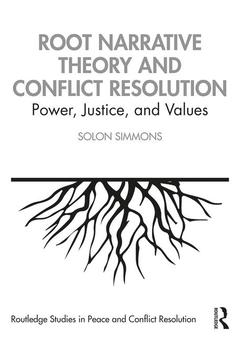Root Narrative Theory and Conflict Resolution Power, Justice and Values Routledge Studies in Peace and Conflict Resolution Series
Auteur : Simmons Solon

This book introduces Root Narrative Theory, a new approach for narrative analysis, decoding moral politics, and for building respect and understanding in conditions of radical disagreement.
This theory of moral politics bridges emotion and reason, and, rather than relying on what people say, it helps both the analyst and the practitioner to focus on what people mean in a language that parties to the conflict understand. Based on a simple idea?the legacy effects of abuses of power?the book argues that conflicts only endure and escalate where there is a clash of interpretations about the history of institutional power. Providing theoretically complex but easy-to-use tools, this book offers a completely new way to think about storytelling, the effects of abusive power on interpretation, the relationship between power and conceptions of justice, and the origins and substance of ultimate values. By locating the source of radical disagreement in story structures and political history rather than in biological or cognitive systems, Root Narrative Theory bridges the divides between reason and emotion, realism and idealism, without losing sight of the inescapable human element at work in the world?s most devastating conflicts.
This book will be of much interest to students of conflict resolution, peace studies and International Relations, as well as to practitioners of conflict resolution.
1. Introduction: Radical disagreement and root narratives 2. Root narrative theory: between social power and scales of justice 3. The story system: deep structures of the moral imagination 4. Critics of power, prophets of peace: Hobbes, Locke, Marx, Fanon 5. Imagining security: Defense, Unity, Stability 6. Imagining liberty: Consent, Property, Merit 7. Imagining equality: Reciprocity, Nation, Accountability 8. Imagining dignity: Recognition, Liberation, Inclusion 9. Conclusion: From root narrative theory to root narrative practice
Solon Simmons is Associate Professor of Conflict Analysis and Resolution at George Mason University, USA.
Date de parution : 02-2020
15.6x23.4 cm
Date de parution : 02-2020
15.6x23.4 cm
Thèmes de Root Narrative Theory and Conflict Resolution :
Mots-clés :
Root Narrative; Hugo Grotius; root narrative theory; Holy Mountain; conflict resolution; Strict Father Morality; social justice; Abusive Power; structural violence; Securitarian Imagination; radical disagreement; Defense Narrative; semiotic systems; Reciprocity Narrative; social identity; Moral Grammar; storytelling; Accountability Narrative; moral values; Egalitarian Imagination; Primitive Sentence; Recognition Narrative; Summum Malum; Moral Logic; Braiding Process; Stability Narrative; Antagonist Function; Stability Story; Inclusion Narrative; Property Narrative; Apocalyptic Genre; Unity Narrative; Moral Clarity; Moral Complexity



